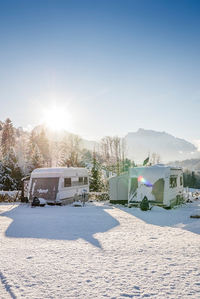During winter most camping vehicles are not in use. Many campers decide to stop using their motorhomes during the winter season. This also reduces tax and insurance fees when the vehicles are not registered during the winter months. It is essential to prepare for this “hibernation” period to prevent damage and to facilitate the start of the summer season later. Airy parking lots with a roof that allow the vehicle to be parked horizontally are ideal to withstand the winter season.
Beware: Non-registered motorhomes and caravans may not be parked in public spaces/public parking lots. Before deregistering be sure to check the date of your vehicle inspection. If this date is set during the winter months, it is advisable to ask for a new date (before deregistration) to avoid problems when re-registering the vehicle later.
Vehicle exterior

Clean the vehicle carefully. Be aware: Tires and windows should not be cleaned with high pressure water jets.
Fix defects in the paint work. Optionally, use car care products.
Check the car´s underbody. Treat rust-prone areas.
Have your car repaired, if necessary.
Treat rubber seals on doors and windows with silicone spray, glycerine or talcum; replace cracked sealing rubbers.
Motorhomes: grease the clutch, break linkages and crank supports and cover the clutch.
Caravans should be jacked to take all weight off the tires. If this is not an option, increase the air in the tires to maximum pressure and remove weight from the tires by lowering the supports.
Manually move your motorhome a quarter rotation of the wheels weekly.
Do not pull the handbrake! Secure the vehicle with wedges.
Vehicle interior
Clean the water system. Empty the water tanks (fresh and processed service/industrial water), pipes, boilers, pumps, and filters. Turn off the water pump. Drain and water taps remain open (in the middle position between cold and hot)!
Clean the camping toilet’s waste-holding tank. It should be completely emptied and properly cleaned.
Close the gas cylinder valve, unscrew gas hoses, and pressure regulator and put on the protective cap.
Remove all food, empty the shelves.
Clean the interior.
Leave cupboards, doors, and the refrigerator open.
Vacuum cushions, leave them in the car or preferably store them in a separate, dry space.
Open forced ventilation and keep it open. Tarpaulins should not cover the ventilation openings. You might want to use tarpaulins that are air permeable.
Air regularly (about every four to six weeks) for one hour in dry weather. If the vehicle is parked inside, an open roof hatch allows for permanent ventilation.
A small bowl of salt is enough to absorb humidity in the air.
Charge batteries fully and recharge regularly. Alternatively, you can remove them and store them in a rust-proof area.
Switch off electricity.
Waterproof motorhomes
Check radiator anti-freeze
Fill with frost-proof windscreen washer water.
Change oil and filter
Change diesel filter or drain the water
Change spark plugs
Fill tank to prevent corrosion damage


